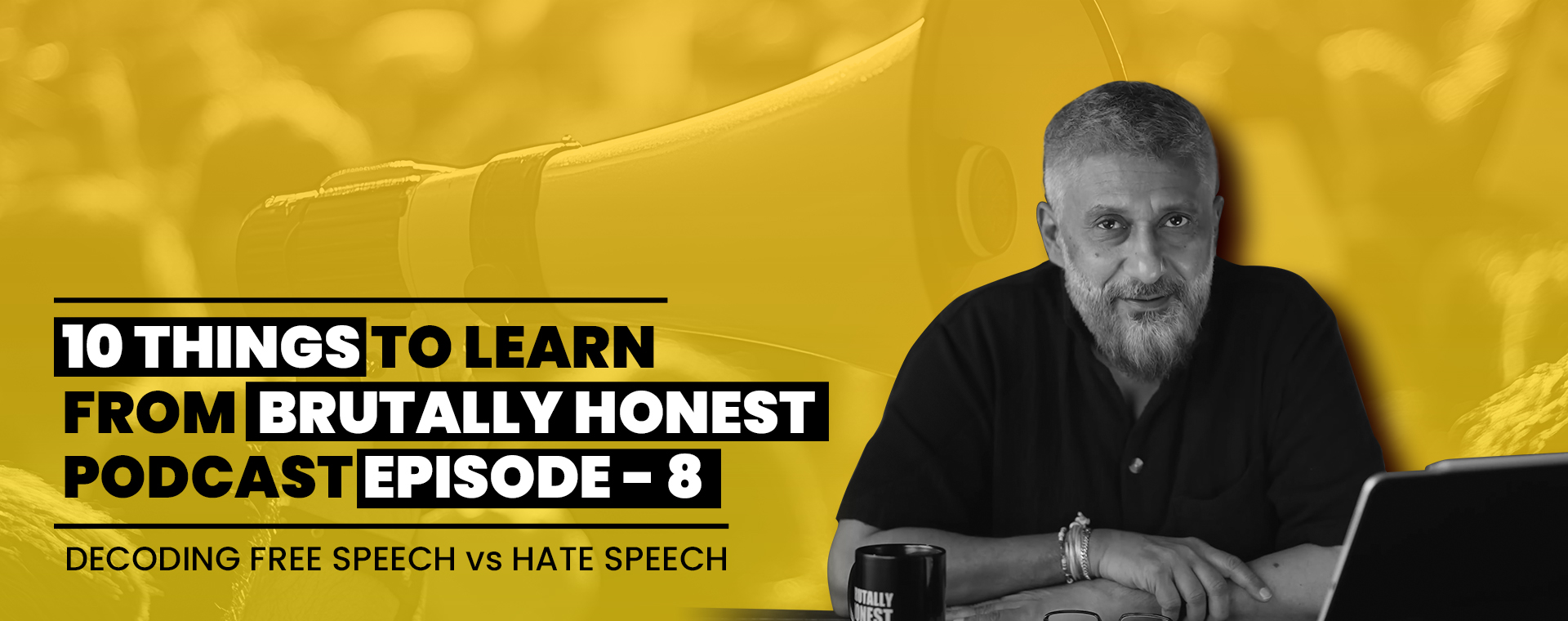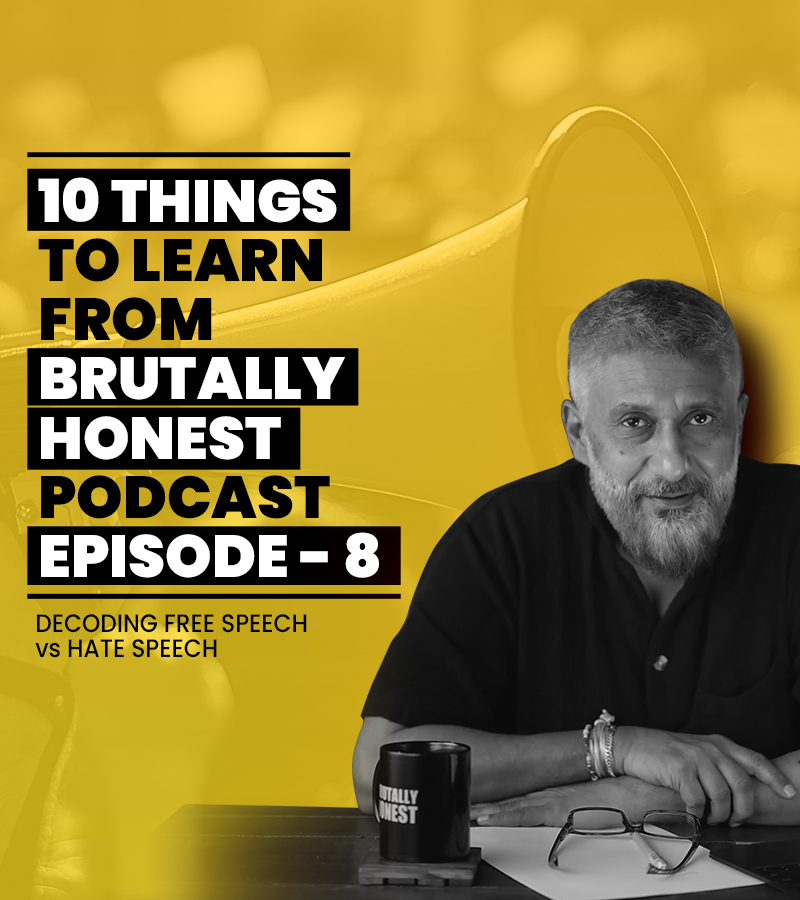

10 Things to Learn from #BrutallyHonest With VRA: Free Speech vs Hate Speech
Is free speech under attack? Or are we unknowingly breaching hateful territory? VRA’s podcast dives deep into this hot debate – join the conversation!
Imagine scrolling through social media, minding your own business, when suddenly a heated argument in the comment section catches your eye. First, you’re there to weigh the differing opinions but soon, the digital tug-of-war starts turning vile and distasteful, crossing the line into hate speech.
While what you’re witnessing isn’t anything new, where is that line that divides free speech and hate speech exactly? Vivek Ranjan Agnihotri asks the same in Episode 08 of #BrutallyHonest with VRA – Free Speech vs Hate Speech? In the podcast, Agnihotri dissects the subtle balance between the two and what it represents in today’s polarised world. Spoiler: it’s not as black-and-white as you may imagine.
But don’t fret, if you’re keen on using your voice wisely without stepping into dangerous territory, here are 10 key takeaways from the podcast.
1. Why Should We Protect Free Speech?
At the soul of any country’s democracy lies the right to free speech. Agnihotri emphasises that without it, there’s no room for purposeful conversation or progress. He points out that true freedom of speech is the ability to express varying opinions, good or bad — whether it’s in politics, art, or everyday life. This independence allows society to evolve, challenge the status quo, and spark productive dialogue. It’s not just about having something to say but making sure everyone is being heard.
2. When Does Free Speech Become Hate Speech?
This is where the lines get blurry pretty fast. Agnihotri maps out the thin line separating free speech and hate speech. One person’s “simple opinion” can easily transform into hate when it targets, humiliates, or endangers a specific group. The key lies in recognising where to draw said line. It’s a fine balance between respecting the right to free expression and protecting communities from speech that encourages harm or violence.
3. How Does The Law Protect Free Speech?
Every country has a different manner of handling free speech. Agnihotri sheds light on the various laws around the world, weighing how free speech is protected or restricted. From the First Amendment in the U.S. to India’s own constitutional provisions, the podcast episode delves into the different ways societies navigate the tension between respecting free speech and administering hate speech. And even if you’re not a fan of legal drama, this might just be the part that interests you.
4. Does Social Media Amplify Hate Speech?
With everyone having access to social media at their fingertips, it’s no surprise that it’s slowly evolving into a breeding ground for toxic discourse. Agnihotri explains how platforms like X and Instagram amplify hate speech, not by design but through their algorithms. These platforms run on pure engagement, and nothing gets people talking (or fighting in the comments) more than contradicting opinions. But here’s the kicker: while social media has democratised free speech, it has also clouded accountability, where a no-name account can spout nonsense and be disabled the next day. So then, who do we hold responsible for harmful content — the user or the platform?
5. How Does Cancel Culture Impact Free Speech?
Agnihotri doesn’t shrink away from the controversial topic of cancel culture. In a world where people are “cancelled” for breathing the wrong breath, he raises the question — does cancel culture kill the opportunity for healthy debate? He argues that cancel culture often smothers free speech, labelling opinions as offensive or hateful without leaving room for people to put forth their views. In a rush to silence, as we losing the ability to engage in intellectually stimulating conversations?
6. Moral Responsibility vs Legal Boundaries
Just because something is legally allowed doesn’t mean it’s morally acceptable. Agnihotri brings attention to the idea that, while laws may allow freedom of speech, individuals must consider the impact of their words and take accountability. Self-censorship, or at least self-awareness, is crucial in ensuring that free speech doesn’t turn into bullets of detest. This takeaway is a reminder that while we have the right to say what’s on our minds, we should also recognise the responsibility that comes with our words.
7. How Does Media Influence Public Opinion on Free Speech?
The media as an institution isn’t just responsible for reporting the news — it plays a hand in shaping public opinion. Agnihotri speaks on how mainstream media often manipulates narratives around free speech, either glorifying, demonising or sometimes completely eliminating certain viewpoints. Media recognises its unadulterated power, framing opinions as virtuous or villainous, depending on the agenda. This forces us to question: are we forming our own opinions, or are we being influenced without our consent?
8. Free Speech in Academia
Universities and schools are the foundation of sprouting free thought and debate. However, Agnihotri points out that the geo-political climate in the world has forced many academic institutions to become increasingly cautious, sometimes oppressing thought-provoking and controversial discussions in fear of being cancelled. He argues that, while inclusion is critical, universities have the responsibility to protect free speech to foster robust debates that challenge orthodox beliefs. After all, growth doesn’t come from being a sheep in the herd.
9. Personal Responsibility in an Era of Misinformation
Fake news is an epidemic of its own. In a digital age, where WhatsApp forwards are how most people stay informed – some of it true, a lot of it false — we must always sift through the information we receive. Agnihotri stresses the importance of personal responsibility when it comes to consuming as well as sharing information. It’s not just about having the freedom to share your point of view; it’s about making sure you aren’t sharing information that is misleading or could be potentially harmful. The solution? Fact-check with a magnifying glass!
10. The Future of Free Speech in a Polarised World
As we become more polarised, the future of free speech looks hazy. Agnihotri ends the podcast with a reflection on where we’re headed, especially as debates become more frenzied and most people prefer withdrawing into echo chambers. The key, he suggests, is advocating for responsible dialogue. Free speech shouldn’t be about silencing others but about making sure everyone’s opinion contributes to building a more respectful, open society.
The Road Ahead
Episode 08 of #BrutallyHonest with VRA offers a nuanced exploration of free speech versus hate speech, compelling us to rethink how we use our voices in society. The thin line between legal rights and moral responsibility isn’t always an easy walk, but it’s essential to ensure we all engage in respectful and meaningful dialogue. If you’re interested in learning what else he has to say, click here.
The question we leave you with is — how do you think we can use our voices in ways that foster growth, inclusivity, and understanding, rather than discord? Share your thoughts and let’s start an invigorating conversation on how we can all contribute to a more accepting, responsible society.






